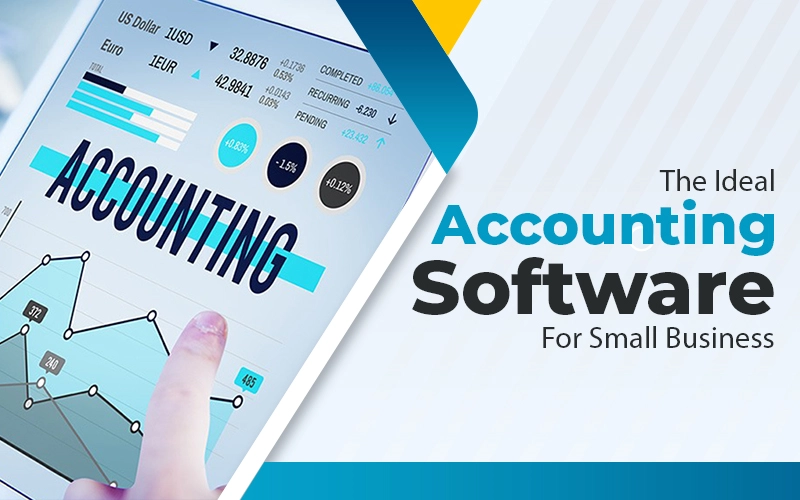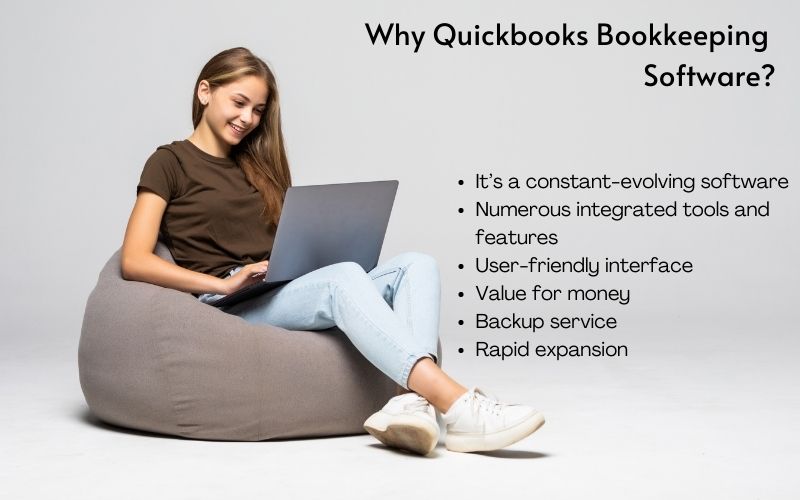Why Quickbooks Accounting Software Is Ideal For Small Businesses

The world is progressing with each passing day. And with that, the environment all across the globe is also changing manifold.
And by the environment, it is not nature that is been specified here, but the overall surroundings encircling mankind.
Gone are the days when people thought about finishing their degrees and getting a decent job for them.
Well, the practice is still there, but not that much trending at present. The present-day is witnessing more and more risk-takers emerging in the market, trying to make a mark and create a base for their products.
Some succeed in doing so, while others fail.
Schedule A Consultation Today!
Now, if looked at closely, maximum cases of failed business ideas, or bankrupt enterprises would have one thing in common for their failure- mismanagement of accounting.
Accounting is an integral part of any business whatsoever, and in the case of small businesses, it is even more essential as there are lots of financial dealings and transactions in the initial stage of a start-up that needs observation as well as consideration.
So, the only two ways to make these things work are one- hiring a small business accountant, or two- using modern accounting software like QuickBooks Bookkeeping.
Follow along with this excerpt to know more about this particular software, and why is it considered to be an ideal one for small business accounting services.

What is QuickBooks Bookkeeping software?
Before plunging any further into the topic, let’s take a brief idea about the software itself. Of all the accounting software for small businesses reviewed, QuickBooks is the best amongst all in an overall aspect.
Not only do a maximum of small business accounting professionals use QuickBooks Online, but there is also an abundance of online training resources and forums where you can get help when you need it.
All accounting features are easily accessible from a single main dashboard, making bookkeeping more fluid, efficient, and convenient as well.
The number of products QuickBooks Bookkeeping has are-
- QuickBooks Premier Plus
- QuickBooks Pro Plus
- QuickBooks Self Employed
- QuickBooks Online
- QuickBooks Mac Plus
- QuickBooks Enterprise
Out of these six categories, QuickBooks Online has four categories of packages available- Simple Start, Essentials, Plus, and Advanced. Most small businesses will benefit from one of these four plans available in the QuickBooks Online product.
It is a cloud-based solution that includes all the essential features for managing your company’s finances. This particular version of the QuickBooks Bookkeeping software even includes numerous integration options, which makes it simple and easy to collaborate with a professional accountant or bookkeeper Los Angeles.
The best thing about this product is its user-friendly interface which makes handling and managing accounting services even easier than before.
Why Is QuickBooks Bookkeeping software ideal for small businesses?
Now let’s see why QuickBooks Bookkeeping is ideal for small businesses-
It’s a constant-evolving software
There are numerous improvements within this particular accounting software that can always be beneficial to the operation of your business. New features are added on a regular basis, ensuring that all of your financial needs are met.
Numerous integrated tools and features
Another one of the essential reasons to make use of this software is that there are numerous useful shortcuts, hundreds of integrated tools, and other important tools and features that make the accounting job way easier. By using this software, users will save a lot of time and improve their work performance significantly.
User-friendly interface
The most important reason for QuickBooks Bookkeeping services being so widely popular and frequently used software is that it has a very easy-to-use interface. With all the features and tools on your face, it becomes much easier for people to understand and make use of the software to its full potential.
Value for money
There is a lot of software available, but nothing compares to what QuickBooks has to offer. It can save you a lot of time and money, both of which can be put to good use for the company. The comprehensive and affordable payment plans are what make it such a widely popular software amongst businesses big and small.
Backup service
A very important feature of QuickBooks Bookkeeping is its integrated backup service which can also be considered a life savior! This helps in keeping all your financial and accounting-related data safe and secured. So, you don’t have to be afraid of losing any past or present financial and accounting data while using this particular software.
Rapid expansion
QuickBooks is customer-focused, and by listening to their customers’ needs, they are constantly attracting new active users. If you start using this software, you will most likely never use another accounting tool again. Moreover, their plan is to reach about ten million users by the end of this decade.
Conclusion
Therefore, these are the reasons why QuickBooks Bookkeeping is considered an ideal software for any kind of small business. Making use of such modern technology saves you time, energy, and a lot of money!
You May Also Read: What Is IRS Levy And How To Get Exemptions?
Contact Us Today:
Locations:
How To Overcome Common Small Business Accounting Challenges

Ecommerce attracts business owners because of its low entry barrier and potential ease of use. Selling popular items on Amazon or eBay seems to be easy. Operating online businesses can be full of challenges. Nevertheless, online business owners as well as their accountants may agree that eCommerce accounting isn’t as easy as most people assume it to be.
Listed below are five small business accounting challenges you may encounter in the eCommerce space and how to overcome them.
5 Common Small Business Accounting Challenges:

Sales Tax Liability
In recent years, eCommerce sales tax has become more complicated. It was the Supreme Court’s ruling in the Wayfair vs. South Dakota case in 2018 that brought about the biggest change in the industry.
Today, online retailers are required to remit taxes in almost every location where they make sales.
Revenue and/or sales volume thresholds were established under new “economic nexus” rules. Businesses must remit taxes based on these thresholds.
In the past, you were only responsible for collecting sales tax where your business is physically located.
Let an experienced firm offering small business accounting services assist you.
Retail may have limited tax locations. Online sellers now have to manage dozens. In addition, sellers have to file taxes monthly or quarterly, depending on their business.
Schedule A Consultation Today!
Inventory Management
No matter how small the business is, managing inventory can be a challenge. Adding new products and sales channels only makes matters worse. You must keep track of what you have, what it is worth, and where it is located if you have more than one fulfillment center or warehouse.
Each sale changes the total inventory quantity. Returns that arrive back in good condition will also change inventory levels. Inventory management poses a challenge even without a tie-in to accounting. This is the backbone of every online retailer’s cash flow, so keeping it under control is crucial.
Scalable integrated inventory management systems are used by successful sellers. You can have up-to-date financial data with this system.
Tracking Seller Fees
For selling on eCommerce platforms you mostly need to pay a flat sum each month. Miscellaneous fees are harder to track. Amazon’s fee structure is a good example. A fee is charged for listing, for transactions, for advertising, and for fulfilling orders.
For shipping, the percentage or flat fee depends on the category of the item, as well as its size and weight.
These expenses are tallied as “Amazon’s Fees” at the end of the month, giving sellers no granularity. This makes budget planning more difficult.
To determine the seller fees paid to the most popular marketplaces, online calculators are available. What about shopping carts and other e-commerce platforms?
Depending on their fee structures, you might be able to track manually. When your business scales, you have less busy work to do when you use automation. This way you can scale your business growth.
You May Also Read: Streamline Your Payroll With Small Business Payroll Services
Handling Returns
Return tracking is an inconvenience of eCommerce. Most sellers allow customers to return purchased items that don’t fit, arrive damaged, or don’t work for other reasons. Repurchases can be boosted by a favorable returns policy.
Accepting returns as a reality of operating an online store is in your best interest. Returns, however, complicate your accounting process. Refunds are processed, and the returned product(s) may need to be restocked.
Careful attention to detail is the key to handling returns. For sellers, it’s important to decide whether or not to write off inventory so they don’t expense it twice.
Many inventory management systems feature returns management. Accounting software can also be manually updated to handle returns.
Manual Data Entry
Almost all items need to be tracked after every sale. This includes seller fees, local sales tax, shipping costs, inventory quantity sold, and more.
Manually entering all this information becomes overwhelming as a business grows. Consult with a firm offering small business accounting services to assist you.
It is possible to outsource this process to an accountant, but you might be surprised by the cost. The process of manually entering data is incredibly time-consuming and rife with errors.
Automating this process can help online retailers overcome this challenge. Ecommerce stores can be connected to your accounting solution by using accounting automation software.
In conclusion, small business owners face a range of small business accounting challenges, from cash flow management to tax compliance. However, by implementing effective bookkeeping practices, utilizing technology, and seeking professional help when necessary, these challenges can be overcome.
Proper accounting is key to the success of any small business, so it is important to prioritize and address any accounting issues that may arise. By taking proactive steps to manage their finances, small business owners can ensure the long-term viability and growth of their business.
You May Also Read: Tax Accountant Vs CPA- Understanding The Difference
Contact Us Today:
Locations:
What’s The Importance Of Foreign Currency Accounting In Small Businesses?

You may be thinking of expanding your store for buyers in other countries. Or perhaps you cracked a deal with a new foreign supplier. Taking your business to the international level is a hard task as well as a big step that determines your growth.
However, dealing with small business accounting when foreign currencies are involved is no fun. Let us check out the basics of foreign currency accounting and all that you need to know.
Why Think Of Foreign Currencies?
So why not just avoid this situation in the first place?
First, most people like paying in their own currency. Now, accepting different currencies may help you attract new customers from different countries.
Second, you may have suppliers accepting their local currency or charge fees for conversion. However, for a better and long-term business relationship, it makes sense that you pay those suppliers with the currency they want.
Getting Practical – How To Pay And Get Paid?
While dealing with vendors or customers in other nations, you must decide the right way to get money from A to B and state the terms properly in online policies and contracts.
It is a good moment to consider what you can do in your small business accounting to keep your transfer fees to a minimum and manage the risks of exchange rate fluctuations.
Choose Proper Payment Methods
How will you get the money from your customers? Or how will your suppliers in foreign countries get their money from you?
- Ecommerce Payment Providers- Find out whether or not your current situation allows you to put down prices and accept payments through various currencies. Depending on that, decide if you are fine with the fees.
- PayPal- This one lets you accept and make payments in over 20 currencies and even hold foreign currency in balances. They don’t charge you for currency exchange.
- International wire transfers- Banks at times charge you a fee of $50 for an international money transfer. You can try new web-based services such as OFX or TransferWise for a quick and better solution.
Setting Payment Schedule
It is better to know when you can have the money entering your account. But invoices must be in foreign currencies.
Why? Remember exchange rates fluctuate, and the value of your invoice may change drastically in some weeks. Get assistance from a firm offering small business accounting services.
Getting paid fast really helps, so you know the invoice is worth it, or you may end up paying more. Once in a while, it may work in your favor, but for proper planning, the shorter the payment time, the better it is.
How To Know What Exchange Rate To Use?
Exchange rates change frequently. You must know which rate you must use when converting amounts to your country’s currency.
The rules are as follows:
- For expenses and revenues – use the rate that was in use during the transaction date. If you find the currency to be stable, it is fine to use a monthly or weekly average. But if the exchange rates are fluctuating, you need to track the rate of every transaction date.
- For liabilities and monetary assets – you must use exchange rates in effect on that date when you have created the balance sheet.
Monetary assets, as well as liabilities, are things with fixed and clear value. Consider an international bank account, accounts receivable, and payable.
When Is It Time For Financial Reporting?
When you think of preparing the financial statement at the end of a month, use proper exchange rates on the balance sheets for converting assets and liabilities included under foreign currency.
It includes the accounts receivable and payable. If the exchange rate changes between the balance sheet date and the transaction date, you list the changes as income in case it is a gain or an expense for loss.
Foreign currencies may be hard to handle, make sure you hire a pro to get the best results and avoid mistakes.
Contact Us Today:
Locations:






